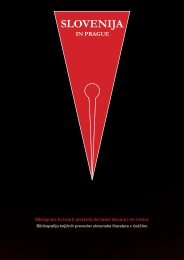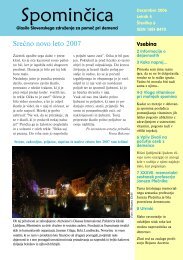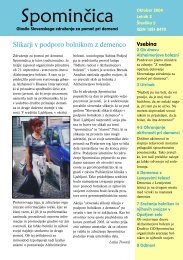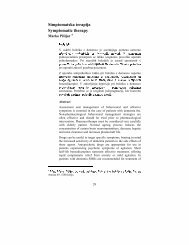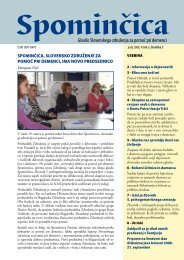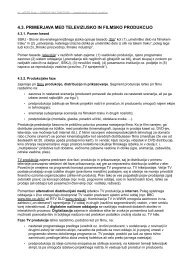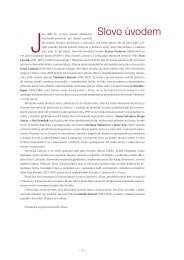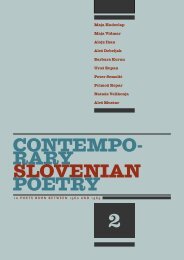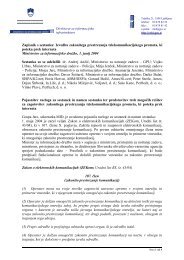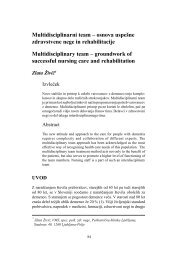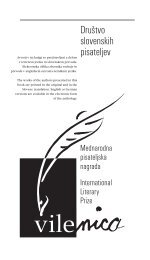Zbornik Mednarodnega literarnega srečanja Vilenica 2003 - Ljudmila
Zbornik Mednarodnega literarnega srečanja Vilenica 2003 - Ljudmila
Zbornik Mednarodnega literarnega srečanja Vilenica 2003 - Ljudmila
You also want an ePaper? Increase the reach of your titles
YUMPU automatically turns print PDFs into web optimized ePapers that Google loves.
his lips were moist. His hands were shaking, I saw. I hoped that his quick-witted,<br />
flippant side would break through now, that he would laugh and say it had all been just<br />
an exercise in self-irony.<br />
"Yes, yes, that's all true, except we can always wring the chicken's neck", he said, and<br />
then calmly proceeded to discuss human relationships as a striving for annihilation;<br />
hence, revolution was the will of the masses. Stalin was the embodiment of the popular<br />
will. He was fair, he did not spare even those closest to him. In cleaning up the world,<br />
he brought hope in the New. Revolutionary rule was no better than what it overthrew,<br />
but revolution fulfilled the dream of blood. If the blood of the righteous and innocent<br />
was spilt, it cried out from the earth, asking God for justice. Revolution was a utopia<br />
of ideal brotherhood rooted in blood. Brotherhood was the age-old dream of the new<br />
man. D. cited time Bible, quoting from The Book of Genesis: "Let us make man in our<br />
image, after our likeness". We parted. He was satisfied, I was exhausted and<br />
demoralised.<br />
We saw each other four or five times more, always in different, out-of-the-way places.<br />
He did not ask me for any facts. I can safely say that he no longer even listened to, or<br />
answered my questions; he was conducting a monologue. He quoted fewer and fewer<br />
figures about weapons, or facts about military bases and Soviet supremacy in outer<br />
space, and produced more and more muddled ideas about "the totality of the created",<br />
about towns and wastelands where a new unity was being forged.<br />
"We are all now in a state of anticipation", he said in parting.<br />
I did not hear a word about him for six months, nor did anyone else from our old circle.<br />
Then one day, in front of the Interior Affairs Ministry in 29 November Street, I ran into<br />
an old school-mate I had not seen for at least ten years. He had finished law and was<br />
now working at the Interior Ministry. He asked me up to his office, there was something<br />
he wanted to tell me. When I walked into the stuffy room, the heavy, musty air knocked<br />
me back, even though the window was half-open. Two office workers were sitting<br />
across from each other, hunched over their desks, engrossed in their papers.<br />
"Do you know who this man is?", my old school-mate asked.<br />
Raising their heads, the two men looked at me. One was cross-eyed and the other as<br />
pale and thin as a hermit.<br />
"He's the one who works for the Intelligence Service", said my friend, offering me a<br />
seat.<br />
"Now all we need is Kardelj and we've got them both in our hands", add the one who<br />
looked like a recluse.<br />
We laughed, and then they explained that my friend D. had written to the Interior<br />
Ministry denouncing me as an agent of the British Intelligence Service. He had sent<br />
them a similar warning about Kardelj. They told me that he had disconnected his<br />
phone, locked himself into his flat and was writing letters to Brezhnev.<br />
That same afternoon, as if by telepathy, he appeared at the supermarket in Jovanova<br />
Street. He had become heavier, cut his hair short and was unshaven, with puffy circles<br />
under his eyes. Out of the corner of my eye I watched him avariciously pile the items<br />
into his basket. He was choosing the bread when he turned around and saw me. His<br />
eyes opened wide, as if he had just seen a vicious beast. oaming at the mouth he<br />
shouted:<br />
"Don't come near me, you spy!"<br />
Dying of embarrassment I immediately moved away, dumped my shopping basket and<br />
left the supermarket, my shopping undone.<br />
My friend D. wound up in the prison mental hospital. There he wrote the novel Words<br />
Uttered In A Groan. I saw the manuscript at the lawyer Baroviæ's, a common friend of<br />
28<br />
ours who visited him occasionally. D. had bequeathed him the manuscript, saying: "To<br />
be sealed until my death." It was an illegible mess of a manuscript, with page upon<br />
page where all you could make out was the number 1948; that was probably the year<br />
in which the novel was set. Only the last sentence was legible: caught in the undertow.<br />
At the end he had signed it, then crossed out his signature and put in an X, like an<br />
illiterate.<br />
He died on December 19, 1974. It was snowing that day and the ground had turned<br />
white. Only a handful of people attended the funeral; most of them I knew or had met<br />
somewhere. Standing by the bier in the chapel was a large woman in mourning, a<br />
transparent veil covering her face. Next to her were two vacuous-looking, disinterested<br />
men. When the coffin was lowered into the ground, no one said a word, or even tossed<br />
in a flower or handful of earth. Night was rapidly falling and the small group quickly<br />
dispersed. I ran towards the tram, away from the cemetery and the spreading darkness<br />
that was so rapaciously devouring the snowflakes. As I huddled in my seat, someone<br />
placed a hand on my shoulder and said:<br />
"We know nothing of one another, and many secrets will go to the grave with us!"<br />
I saw the man who had been lingering around me at the funeral, he had brushed by me<br />
two or three times and even wanted to strike up a conversation. I was in the mood to<br />
discuss anything now, including death; I wanted to invite him to sit down, but he was<br />
not on the tram any more. That stranger's hand, which had rested on my shoulder only<br />
a moment before, weighed on me the entire time like a heavy tombstone. Who was that<br />
man?<br />
29<br />
Translated by Christina Pribiæeviæ



